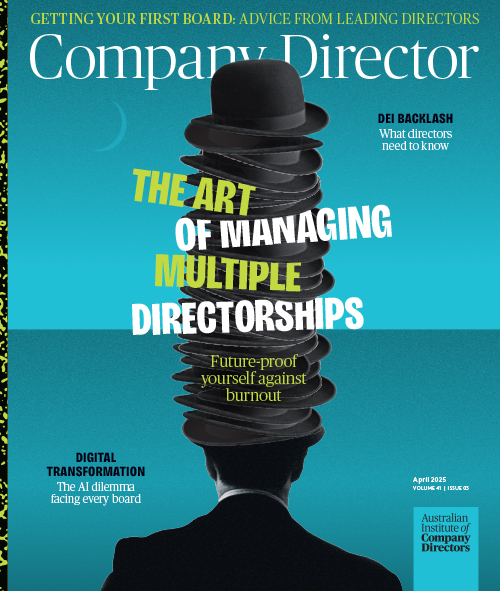Candid conversations with directors on the interests and insights that have shaped their careers.
Favourite career lesson?
Effective performance requires the very best people. Typically, the very best people are smart, loyal, ambitious and can deal with setbacks. I learned this in business and in sport when I played for the All Blacks. Sport is largely about people. You’ve got tactics, technique and execution on the field, but really it’s about the people, teamwork and how you’re able to work together.
Favourite habit for work effectiveness?
Work effectiveness is achieved by carving out time for thinking — for not being interrupted — which leads to a continued focus on the right big issues. As a senior executive or board director, it’s easy to get pulled down rabbit holes. You need to make sure that you’re constantly pushing back to the operational executives to deliver on the short term, while you’re also working on the bigger picture over time.
Favourite tactic for managing a challenging diary?
When I was running a large corporate, I’d never take meetings before 10am. I’d come into the office and clean up everything that had spilled over from the day before or that I’d been meaning to get to. It was also a time to talk with my PA to ensure I was up to speed. I also find it helpful to work on planes. I don’t send any emails until I land.
Favourite collaboration?
In 2006, at Fairfax, we acquired Trade Me for $625m, which was then considered overpriced, but turned out to be a great buy. The collaboration with the Trade Me team, particularly leaders like Sam Morgan and Rod Drury, was instrumental in teaching me about the rapidly arriving world of digital media.
Favourite piece of advice for aspiring directors?
Be humble, be smart, be yourself. People want to work with people they trust, like and who are collegial, but you’ve got to be able to add value. Each person will have an experience and learning base that gives them, if not unique insights, important insights. Be thoughtful about that and bring brains. All boards and senior management need smart people who can solve problems.
Favourite recent read?
The Good Soldier Švejk by Jaroslav Hašek, written after WWI, was the inspiration for Joseph Heller’s Catch–22, M*A*S*H by Richard Hooker and a number of Monty Python skits. It’s about a bewildered Czech soldier trying to find his regiment and offers a very funny commentary on the incompetence of administration and management of the people around him. It makes fun of bumbling, pompous leaders. Švejk muddles through, zealously responding to rank stupidity, and never loses his good nature. You can’t figure out if he is a genius or a halfwit.
Favourite way to destress?
I’m quite good at just switching off and accepting if I can’t do much about something, I shouldn’t worry about it. I won’t have it churn over in my mind to make myself frustrated and anxious if nothing’s going to come from it. I just let it go. I’ve learned that because I have been in a variety of intense, stressful environments as a junior doctor, in business and at a high level of sport.
Favourite place to travel?
We have a place in New Zealand, in Hawkes Bay, on 50 acres overlooking the sea, which we love to go to. My wife runs a small farm there. We have planted a large wetland, which keeps us really involved and interested. We go back and see the plants and trees growing, the dams filling up in winter. Nature progresses at its own pace, and it takes you with it if you are attentive.
David Kirk MBE MAICD is chair of Bailador Technology Investments (BTI) Ltd, KMD Brands Ltd, Forsyth Barr Ltd, BTI investee companies Rezdy and Rosterfy, the NZ Rugby Players Association and food rescue social ventures KiwiHarvest and NZFN. He is a former CEO of Fairfax Media and was an All Blacks captain.
Latest news
Already a member?
Login to view this content



